Modern Parenting: Trends Shaping Family Life and Behavior
CONSUMER INSIGHTS
Parenting is evolving, with parents adopting intentional, emotionally aware approaches that redefine family roles and influence consumer markets. From child-led consumerism and reparenting to intensive parenting and shifting family structures, this transformation has broad implications for businesses looking to engage modern parents.

The Big Picture is our hub on the Nextatlas platform for understanding the huge macrotrends shaping our society. It distills key insights from vast data sets on themes that seem too big to comprehend, uncovering actionable insights that can get lost in the noise. This is the Big Picture on parenting.
The Big Picture on Parenting
Parenting in the 21st century is undergoing a profound transformation, influenced by evolving societal expectations, shifting family structures, and an increasing focus on emotional well-being. Parents today are driven by a heightened awareness of the emotional, psychological, and social dynamics that shape family life, resulting in choices that affect both their children’s development and their own well-being. They’re redefining traditional roles, adopting more intentional approaches, and reshaping the market through these choices. This evolution reflects broader societal trends and has significant implications for consumer behavior, market research, and the understanding of contemporary parenting styles.
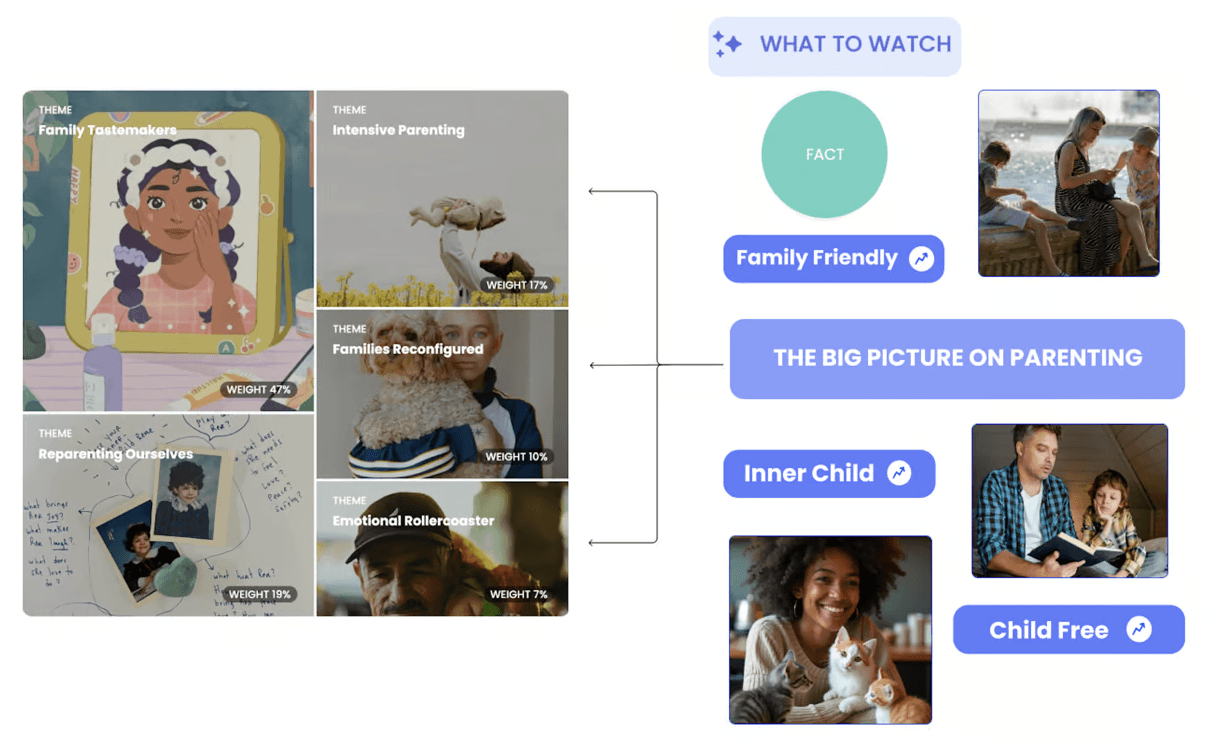
The top trends from The Big Picture on Parenting on the Nextatlas platform
Parenting in the Modern Era
Modern parenting is not just mere caregiving. Today, new parents play a very active role in shaping their children's physical, cognitive, and emotional journeys while also focusing on their own self-growth alongside their parenthood. This shift is driven by a heightened awareness of mental health, personal development, and the increasing influence of children on household decisions. Five key minitrends define this macrotrend, each offering valuable insights into modern parenting styles and market behaviors.
1. Family Tastemakers: The Rise of Child-Led Consumerism
Children are no longer passive consumers; they are now central decision-makers in the household. Generation Alpha, comprising children born from 2010 onwards, has become a significant consumer group with an estimated spending power of $28 billion. Their preferences are meticulously studied and actively targeted by brands, such as Samyang’s spicy ramen and Owala’s water bottles in the food and beverage space. The emergence of the "Sephora Kids" phenomenon in 2024 also exemplifies this trend, with children as young as 9 to 12 years old actively engaging in beauty routines and influencing market dynamics.
The intentional approach that modern parenting exhibits extends to all aspects of life, from the products children consume to their play activities and daily interactions. Parents must now strike a balance between catering to these interests and needs while maintaining control over purchasing decisions. In a world where children's preferences can influence broader market trends, parents continually navigate the line between enhancing their children's lives and resisting external pressures. This trend is reshaping engagement strategies, compelling businesses to rethink how they market to families while respecting parents’ desire for thoughtful, quality-driven consumption.

Credit: gnpsvillager.org
2. Reparenting Ourselves: The Intersection of Parenting and Self-Healing
A growing number of the new cohort of young Millennial and Gen Z parents are embracing self-growth by addressing their own childhood wounds. It involves adults addressing and healing their own childhood experiences to foster resilience and emotional intelligence in their children. This psychological shift is often popularized on social media and by public figures like Dr Becky Kennedy. In her discussions, Dr. Becky highlights that our reactions to our children's behaviors often stem from our own childhood experiences. By becoming aware of these triggers, parents can better regulate their responses, leading to healthier interactions with their children. This process involves acknowledging and nurturing the parts of ourselves that may have unmet needs from our past, thereby breaking negative cycles and promoting emotional well-being within the family.
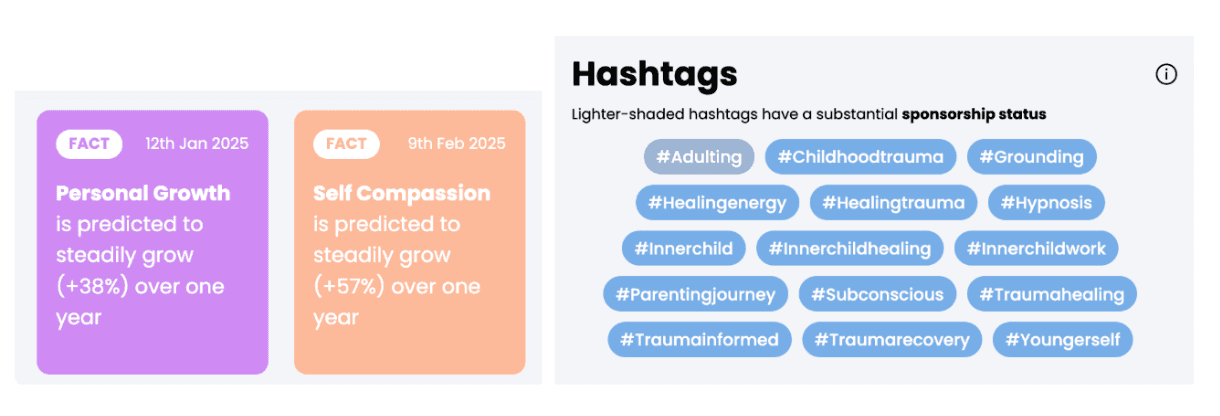
Top hashtags and facts from the "Reparenting Ourselves" trend on the Nextatlas platform (screenshot taken in March 2025)
Activities such as mindfulness, therapy, and reconnecting with childhood joys are becoming essential tools for modern parents. The rising interest in self-compassion (with predicted growth of 57% over the next year) underscores the need for brands to recognize these new emotional motivations behind consumer decisions.
3. Intensive Parenting: The Push for Optimization
Parenting has transformed from a natural role to an intensive, expert-driven endeavor. Parents are expected to carefully curate every aspect of their child’s upbringing—from educational toys that enhance cognitive development to meticulously planned diets. This heightened pressure has sparked a market demand for products and services that promise efficiency, enrichment, and scientifically backed benefits.
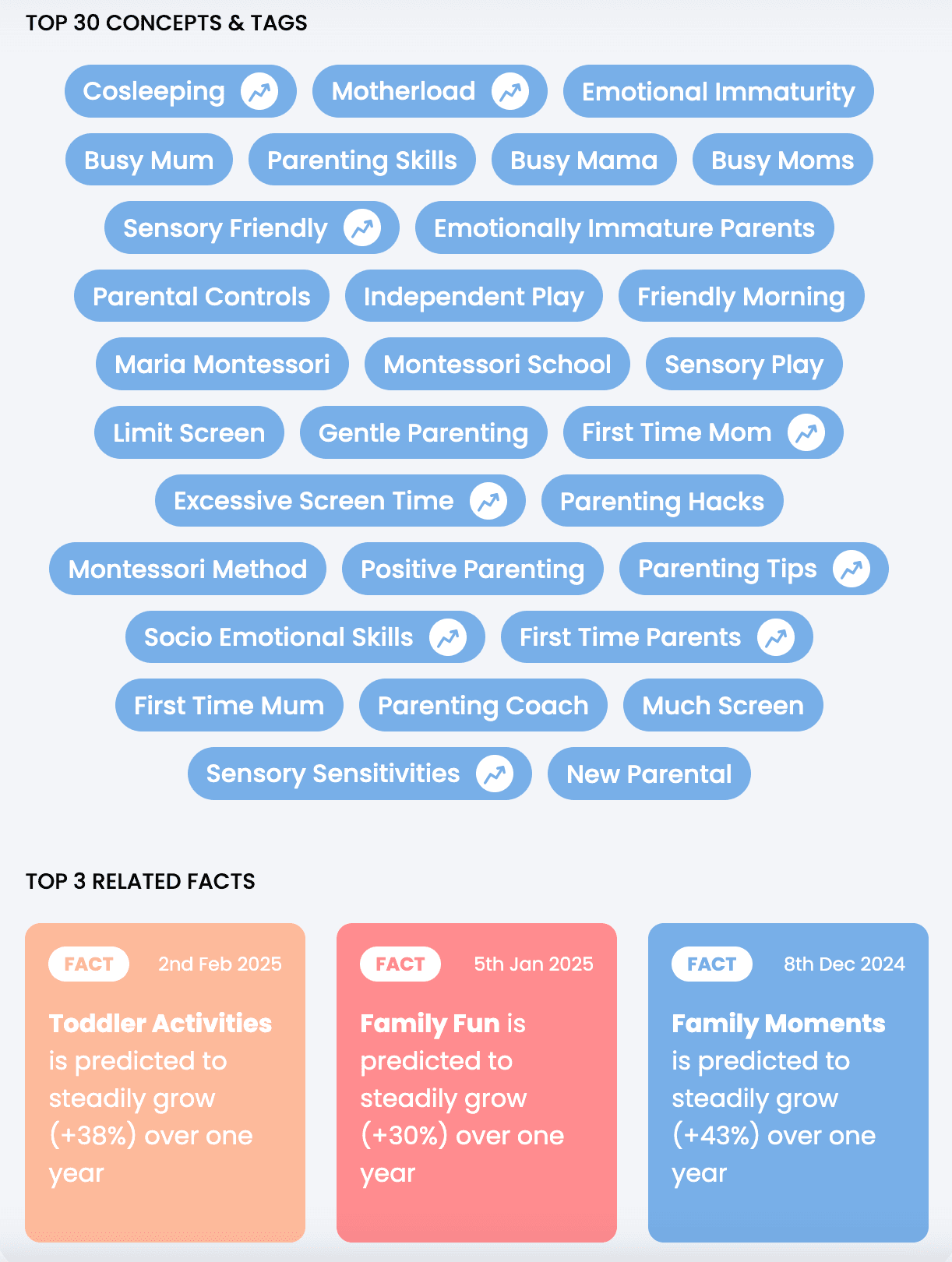
Top concepts, tags and facts from the "Intensive Parenting" trend on the Nextatlas platform (screenshot taken in March 2025)
The digital landscape has also adapted to support intensive parenting practices. The parenting apps market is projected to expand from $1.53 billion in 2024 to $1.72 billion in 2025. These apps provide personalized guidance, developmental tracking, and virtual support, catering to parents seeking reliable and convenient tools to enhance their children's growth.
Businesses that recognize these dynamics can better cater to parents' needs for reliability, ease, and developmental impact, offering products and services that align with their aspirations while acknowledging the associated challenges.
4. Families Reconfigured: The Changing Definition of Family
The definition of family and parenting is expanding beyond traditional structures, reflecting broader societal and cultural shifts. Parenting today involves redefining what family means, embracing diverse forms of caregiving that extend beyond biological roles and the traditional nuclear family. This shift acknowledges various family configurations, such as mentorship, fostering, co-parenting and community parenting beyond biological ties, and even pet care.
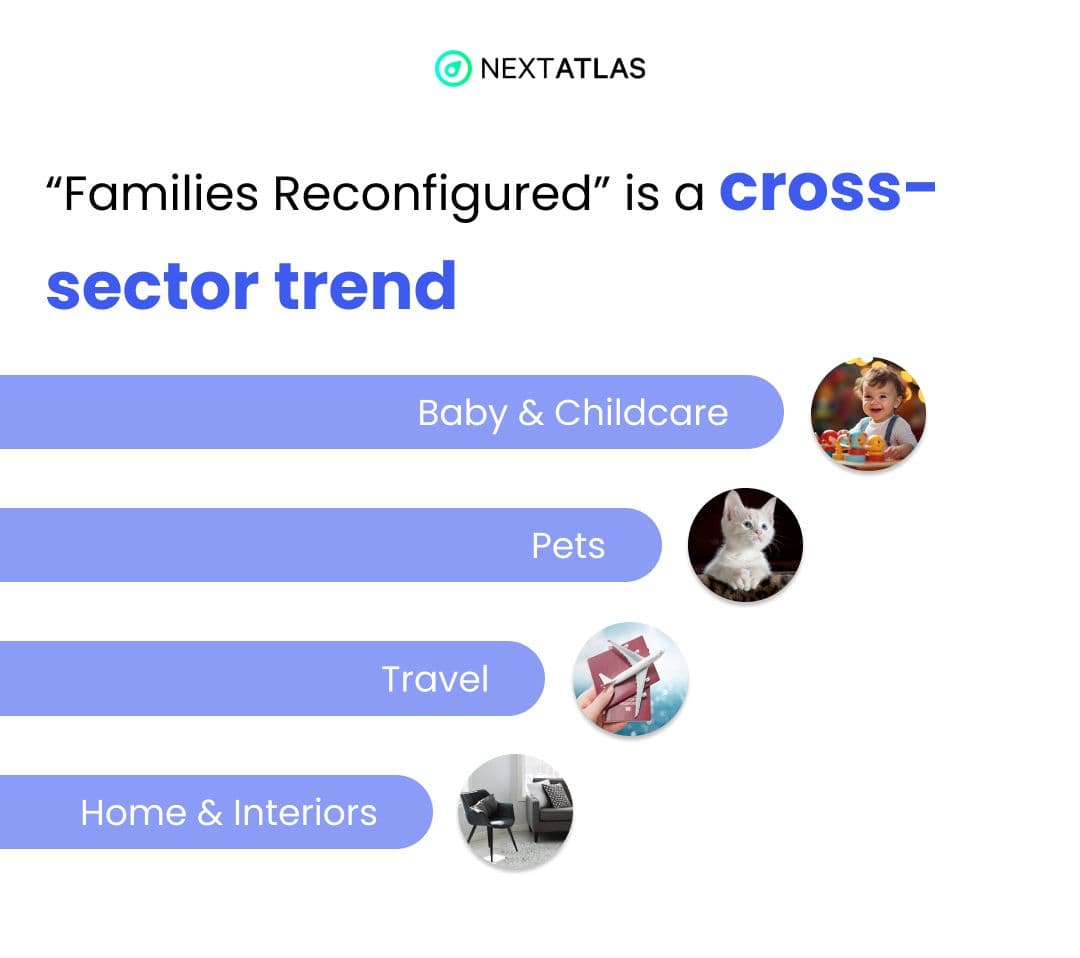
Top industries associated with the "Families Reconfigured" trend on the Nextatlas platform
Economic and social shifts are reshaping how people approach family life, with younger generations redefining what it means to raise children. The declining pressure to follow conventional life stages (such as marriage before parenthood) is influencing everything from housing markets to product development. Companies must acknowledge this fluidity and create inclusive marketing strategies that resonate with modern families.

A moodboard from the "Families Reconfigured" trend on the Nextatlas platform (screenshot taken in March 2025)
5. Emotional Rollercoaster: Navigating the Highs and Lows of Parenthood
Parenting is an emotionally charged experience, filled with moments of immense joy and deep frustration. Simultaneously, parents are exploring their own emotional needs and healing, seeking balance amidst the inevitable highs and lows of parenthood. This has led to the evolution of matrescence, which views entering motherhood as a complex, nuanced journey marked by ambivalence and struggle.' Lucy Jones, in her book "Matrescence, on the Metamorphosis of Pregnancy, Childbirth, and Motherhood," compares this transformative impact to adolescence, highlighting the physical, emotional, and psychological changes mothers undergo without the similar societal support for adolescence.
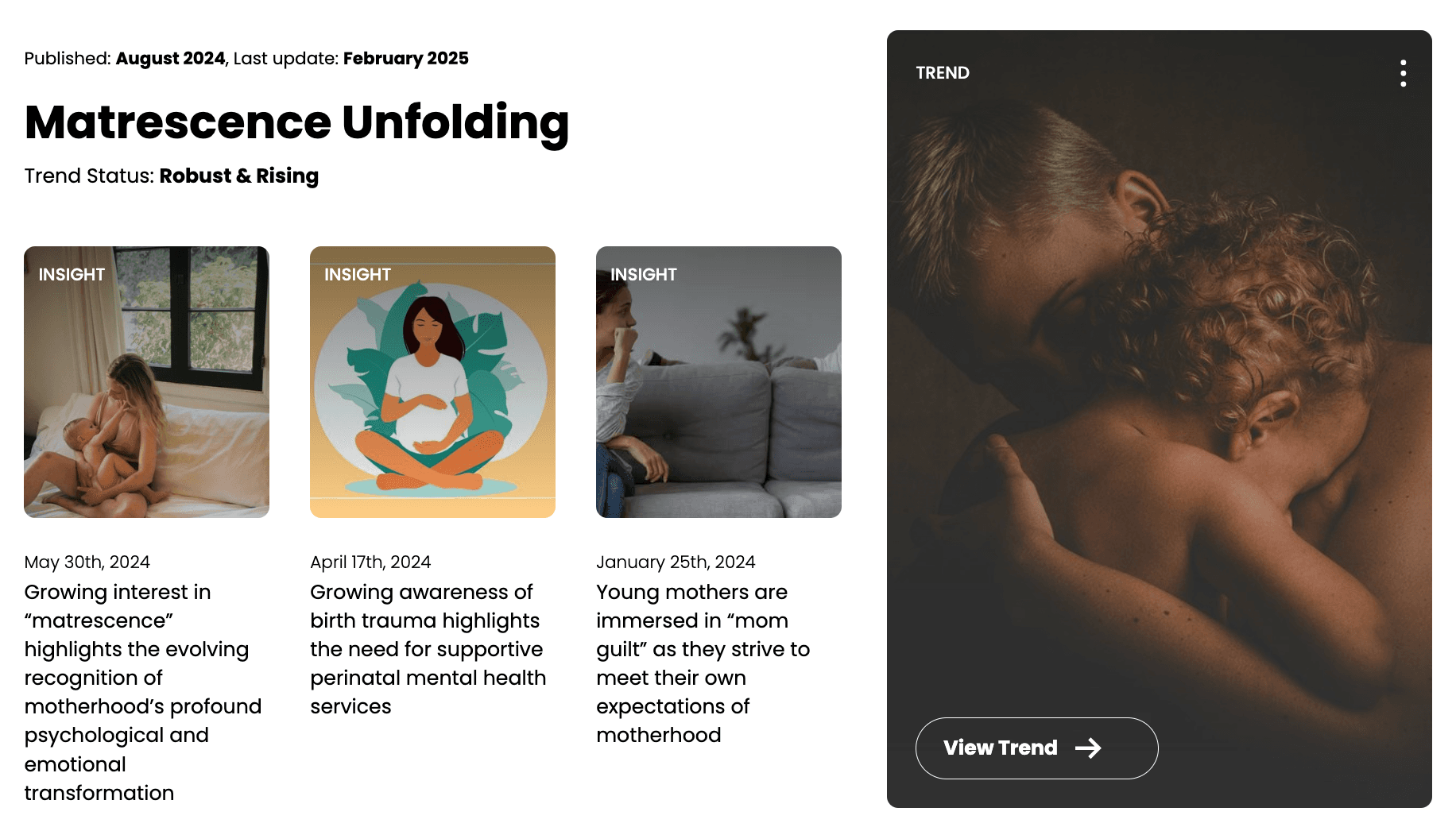
A view of the "Matrescence Unfolding" trend from the Nextatlas platform (screenshot taken in March 2025)
The challenges of caregiving—ranging from daily decision-making pressures to managing personal and emotional growth—are recognized as part of a more fluid, emotionally charged experience. Nextatlas' predicted 21% growth in mindfulness conversations highlights a lucrative opportunity for brands in wellness, self-care, and emotional support industries. Businesses that offer solutions to ease parenting stress—whether through community-building, mental health resources, or convenience-driven products—can effectively connect with the parent demographic.
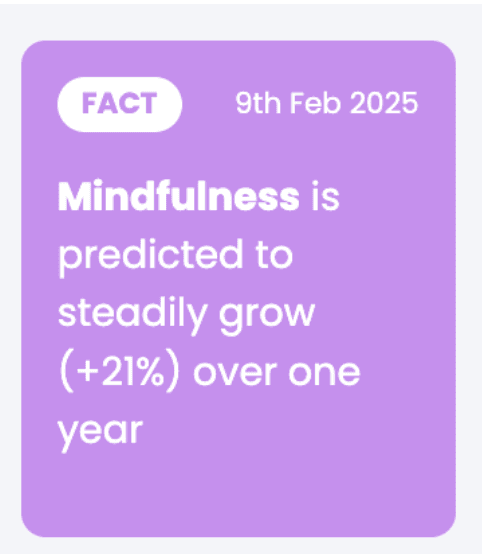
A view of a fact on Mindfulness conversations from the Nextatlas platform (screenshot taken in March 2025)
What These Parenting Trends Mean for Market Research and Consumer Insights
The evolving landscape of parenting presents significant implications for businesses, marketers, and researchers looking to stay ahead of consumer behavior trends. Brands that recognize the emotional, psychological, and practical concerns of modern parents will be better positioned to build trust and loyalty. Whether through personalized marketing, wellness-driven campaigns, or child-centric innovations, understanding these emerging parenting styles is key to tapping into the next wave of consumer demand.
As parenting continues to adapt to contemporary realities, one thing is clear: the market will need to evolve alongside it. Businesses that align with these trends—offering thoughtful, research-backed solutions—will thrive in this ever-changing landscape. By keeping a pulse on the latest consumer insights, brands can ensure they stay relevant in the dynamic world of modern parenting.

Trend lines, data, and information described in this article emerge from the ongoing analysis performed by Nextatlas on its global observation pool made of innovators, early adopters, industry insiders expressing their views on Twitter, Instagram, and Reddit.
To learn more about our AI, discover Nextatlas Methodology here
Related articles:
Italy
Torino - Via Stampatori 4, 10122(Operational headquarter)+39 011/0864065VAT number and registration number at the Registro delle Imprese di Cagliari: 03428550929 paid share capital € 167.740,00 — © 2024 iCoolhunt SpA.




